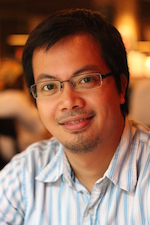 Nguyen Duc Nhat, Vietnam
Nguyen Duc Nhat, Vietnam
Chairman of the Board and Lead Researcher
VietSurvey Research and Analysis
Public Policy Program (’02)
Please tell us about your career path so far. What is your area of specialization and how did you come to work in this area?
In short, my career over the past 15 years can be described as a transition process from state-to-public services one. Upon my graduation from the Foreign Trade University I joined the Ministry of Trade and worked for the Trade Policy Department for six years including one academic year in GRIPS, Japan. Together with my colleagues, I contributed to the economic integration of Vietnam through concluding the Bilateral Trade Agreement with the U.S, which officially opened the largest export market to Vietnamese goods and services. The trade negotiation has been a reform process for Vietnam in all sectors, from trade in goods, trade in services, investment policies and regulation and Intellectual property rights protection. By 2003, one year after coming back from GRIPS, Japan, I became the youngest member of the Vietnam National Delegation for Accession to WTO negotiations and stayed with the team until all technical negotiations had been concluded in the Geneva 9th multilateral round. In 2005, together with two other State officials, I founded the first non-state research institute in Vietnam which laid a firm foundation for an independent research think-tank and institute such as VietSurvey in its present form. I also registered in the Ph.D. program at the Université Paris I Pantheon Sorbonne. I expect to obtain my Ph.D. degree – with my thesis on the key determinants of economic growth of transition economies – this August. During my academic years with Paris I University, I was also a visiting research fellow at the Institute of Development Studies, The University of Sussex (U.K) and got three publications in refereed journals and had a number of working papers and policy
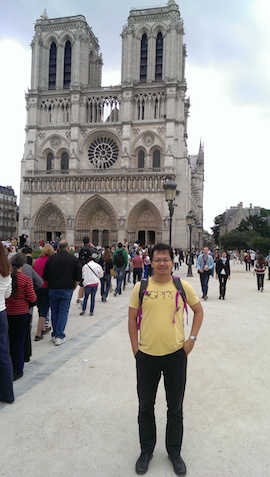
Nhat in front the “Notre Dame”, Paris
papers published, both domestically and internationally.
VietSurvey is one of the leading non-state research groups in Vietnam on micro-data and development studies. Given my position as Chairman of the Board of VietSurvey my main responsibility and duties are comprised of three pillars: strategy and planning, training, and leading a research team on governance and equality studies. It means I spend about 30% of my working time on coordinating the Board of Directors of VietSurvey including strategy, planning and human resource management. As I founded “VietSurvey training series” and “VietSurvey summer school”, I am also in charge of organizing the annual training and lecturing classes and technical workshops hosted by VietSurvey, which takes me several days per month. I sometimes deliver visiting lectures at different universities in Vietnam on sub-topics of my interested research. Lastly, as a researcher, my remaining time is on individual and group research on governance and equality research. My governance team maintains a long-term research agenda with the Institute of Development Studies (University of Sussex, U.K) and Maison des Sciences Économiques (Paris I University, France), and recently with the University of Washington in the U.S.
In your current capacity, what do you see as the main opportunities and challenges for Vietnam over the course of the next five to ten years?
Given my experience in both state and non-state sectors I remain positive on Vietnam’s economic resilience but I am pretty negative about the economic and political reform in our country. My personal observation and research converge to a firm conclusion that the Vietnamese economy sustains and develops thanks to the strong resilience of the informal sector and the improved quality of governance at the sub-national levels. However the “gradualism” ideology of the central government has been preventing the economy from a significant taking off. In the course of the next five years, I believe the Vietnamese economy will remain struggling with the low-middle income trap, widening inequality and rising social problems. However, in ten years time, some radical social and structural changes could be in range of my views.
What are some of the biggest challenges you face in your work? And what have been the most interesting or rewarding aspects of your career thus far?
The biggest challenges I have faced in my work are sustaining a non-state research group within a transition economy like Vietnam. We receive no support from the government and have to operate within an opaque legal framework. There is no political recognition for entities like ours. We do not have access to any concession schemes from the state budget and we even have to pay tax as an enterprise for our public services such as training and research activities. A couple of independent research groups were established after VietSurvey but most of them have closed down and/or have been transformed into state entities.
One of the interesting and rewarding aspects of our career and my own is the social recognition, both from state and non-state actors. We have become a reliable partner of Vietnamese government bodies due to our work standard and rigor, and the fact that only Vietnamese can understand and help Vietnam. My work on growth theories has been reflected in the National Social Economic Development Plan (2010-2020) from both Government and Nat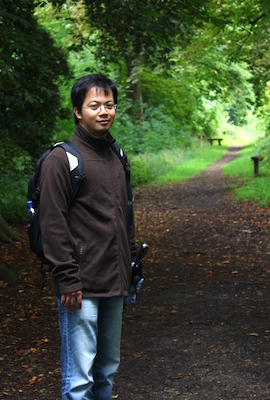 ional Assembly agenda. This is not frequently seen in Vietnam since most policy research is done solely by state institutes. I, however, wish they could be more open and listen more to our talented Vietnamese abroad. Internationally, we have been recognized by world-class universities in our fields and as a resource center for many development partners in Vietnam. We not only solve Vietnam’s particular problems but also contribute to the world literature and knowledge.
ional Assembly agenda. This is not frequently seen in Vietnam since most policy research is done solely by state institutes. I, however, wish they could be more open and listen more to our talented Vietnamese abroad. Internationally, we have been recognized by world-class universities in our fields and as a resource center for many development partners in Vietnam. We not only solve Vietnam’s particular problems but also contribute to the world literature and knowledge.
During your career thus far, what achievement(s) are you most proud of?
So far, I am most proud of my research work during my time with the Université Paris I Pantheon Sorbonne (France) and Institute of Development Studies (U.K) as I have been working in a team of leading professors in the field. I am also quite proud of my first higher education year in Japan where I completed an amazing number of courses that have greatly supported me in my professional career and leadership role later on. Honestly, being the youngest member of the Government Negotiation Delegation did inspire me a lot but the feeling is not as long lasting as the academic inspiration.
What led you to GRIPS? What is the most important thing you got out of your studies here, and how has your experience at GRIPS prepared you for future endeavours?
Back to the year 2000, as a member of the elite team to the Vietnam – U.S Bilateral Trade Negotiations all members were required to have completed Western education in economics and trade. As we conducted negotiations with our U.S counterpart, European and Japanese education were much more favorable than other destinations. I learnt from my colleagues in the Ministry that GRIPS had launched post-graduate programs with diversified courses for public policies study and that the selection of candidates was based on a fair competition. I submitted my application directly to the GRIPS Admission Office and was so happy and proud to be accepted by the selection committee. Actually, my experience at GRIPS has reshaped my view of my future career. I became aware that I could contribute to society and community from various platforms such as policy planning, academic research, community and social work. The GRIPS experience has provided me with Japanese values of sincerity and patience, and international values of respect for the different values and practices. Having completed my courses at GRIPS has boosted my belief that I could pursue higher education. When the Ph.D. selection committee and professors in Paris Sorbonne screened the courses and papers I wrote at GRIPS, they informed me that my degree and education in GRIPS are as good as any good European university. I am very proud and thankful to GRIPS for that.
What is your fondest memory of your time spent at GRIPS? And what do you miss about Japan?
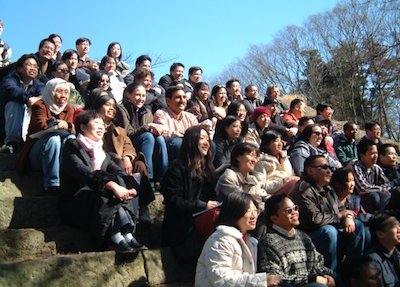
Field trip to Aizu Wakamatsu
I wish I could spend a little bit more time in GRIPS and Odaiba as I enjoyed each and every moment there. I always remember clearly the first day when we were all sent to a concert in Tokyo where we learnt when and how to clap our hands after the vocal and instrumental performance. I also remember my special course in Economics of Laws where only four or five students completed the course, out of an initial enrollment of about thirty.
My fondest memory is when I walked in the rain from school (that time the GRIPS campus was located in Shinjuku) back to Shimbashi station instead of taking the subway, thinking of some discussion in class and at the same time watching Japanese vendors on the sidewalk. I tried street vendor barbecue from time to time, and sometimes small and traditional udon noodles with other Japanese walkers. I felt how much Japanese love their country and daily life and how peaceful the life and air was that surrounded me. Of course, our trip to Aizu is an unforgettable memory to me, and Sunday soccer time in Odaiba still woke me up until several years later on.
How do you maintain a balance between your work and the rest of your life?
Before going to GRIPS, I mostly worked within the Ministry without paying attention to leisure and other educational activities. Since my graduation in GRIPS, I leant that life is special and spacious enough for everyone though we only have 24 hours per day. I have gradually developed my life around three pillars: research, family and community work and I find joy and pain in all of them. For the last few years, I have played different kinds of sports of which billiards, rowing, walking and circuit training remain my hobbies. I plan to resume my piano class hoping I can play some tunes that are bearable, at least to my friends’ tolerant ears. Reading and writing, of course, is something I feel comfortable with both in terms of work and entertainment. I write poems sometimes and mostly about my beloveds and special feelings in my life.
If you could give one piece of advice to anyone considering studying at GRIPS what would it be?
Each and every person will find his own way to higher education. To me, my path to experience with GRIPS is so unique and valuable in that I found both Western and Oriental wisdom, values that can stand and trigger the innovative, decent seeds inside me. If you could come to GRIPS, it is likely that you may enjoy every minute there both in academic and social life, like I did.
How would you like to maintain involved with the School? What do you expect from GRI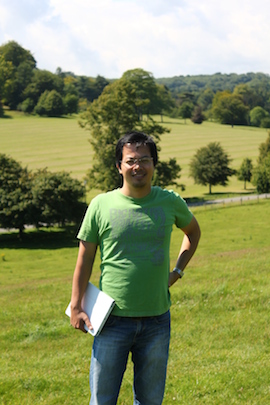 PS as an alumnus?
PS as an alumnus?
I believe that by completing my Ph.D. at the Université Paris I Pantheon Sorbonne will allow me a better position to sustain the scholar/academic exchange with the School. At VietSurvey we will start some cooperation with IDE/Japan this year and being involved with my beloved and respectful fellows of GRIPS would be my honor. Our Vietnamese friends who studied with me at GRIPS in 2001-2002 maintain close connections even though we work in different fields. We support each other as much as we can and most importantly we always feel warm seeing and talking to each other.
Do you have any suggestions on how to further utilize the GRIPS alumni network?
Six years ago, my team and I conducted research for the UK alumni network in Vietnam and here are some lessons learnt from that qualitative assessment: The alumni network and school should involve the students immediately before and after their graduation. Students feel fresh and a strong connectedness to the school right after their graduation but most schools ignore that. The alumni structure can be thematic and sector-based to form stronger sub-networks. The alumni should be employed for promoting the school’s image and supporting student’s pre-departure and returning home. Online platforms and offline events can both positively contribute to the network strengthening.





